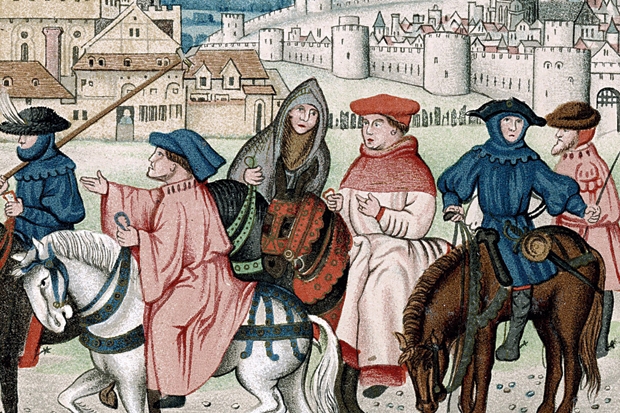Among the precursors to this breezy little book are, in form, the likes of The Story of Art, Our Island Story and A Brief History of Time and, in content, Drabble’s Oxford Companion to English Literature and Johnson’s Lives of the Poets. Other notable precursors are How to Read a Novel by John Sutherland, How to be Well Read by John Sutherland, 50 Literature Ideas You Need To Know by John Sutherland, Lives of the Novelists by John Sutherland and more in that vein. The tireless and compendious Dr Johnson — ‘the first great critic of English literature’ — deserves and receives a chapter to himself here, and it’s no great surprise that the tireless and compendious Professor Sutherland entirely sees the point of him.
One marmalade-dropper to pause and mull on: ‘The average literate person reads 600 works of literature in an adult lifetime.’ That does not seem all that many at all — maybe ten a year. Timor mortis conturbat me. It’s only the most full-frontal of Sutherland’s many arguments that if we’re going to make the most of our reading lives there’s no harm in listening to some recommendations. Absent Dr Johnson himself, Sutherland is as good a guide as you could hope for. Here’s a romp through the history of literature from before the Iliad to the age of the Kindle.
Old Sutherland was never your man for close detail, mind. His version of Oscar Wilde’s quote on the death of Little Nell isn’t quite the familiar one; ‘from sea to shining sea’ becomes ‘from shining sea to shining sea’; and the first time he trots out Eliot’s line about humankind and reality, ‘very much’ has become ‘too much’. He translates e pluribus unum as ‘out of many, comes unity’ and il miglior fabbro as ‘the greater artist’. He has Henry James chastise ‘English fiction’ as ‘baggy’ — when of James’s three examples of baggy monsters one was French and one Russian. He refers to the ‘Great Tradition’ (without crediting Leavis) and donates Conrad’s place in it to the Brontës. Yadda yadda. All this may look like nitpicking, but what I mean to get at is that this is best used as a guidebook rather than a work of reference.
As a guidebook, it’s a cracker. What Sutherland has to offer is formidable breadth of reading, a generous spirit and a rebounding enthusiasm for his subject. He’s not a sneerer — indeed, only occasionally will he allow himself a sharp little aside, noting that literary utopias are generally extremely boring ‘and More’s is no exception’, or of Bret Easton Ellis’s Lunar Park, ‘Got it? Neither did I.’
Instead, he gallops hither and yon (and sometimes backwards and forwards) to direct the reader’s attention to the glories of world literature. Look! Shakespeare! Wow! George Eliot! Criminy! The Epic of Gilgamesh! Here is a writer on the canon who’s not afraid to trowel on the superlatives. Dickens is ‘the greatest ever novelist’, Jane Austen ‘a genius’ and so on. No harm in that. Enthusiasm first; fine discrimination second. Here’s a book whose obvious market is clever teenagers: it’s a primer in the shape of the subject, a lively and good one.
It isn’t, except patchily, a work of criticism. Sutherland’s not all that interested, here, in the internal exigencies of literary form. Hopkins’s description of Tennyson as ‘Parnassian’, in Sutherland’s reading, is a grumble that the Poet Laureate ‘surrendered too much by “going public” ’; but as Hopkins explained the term it’s more a complaint about the easy magniloquence of his poetic language. Modernism, here, presents as a crisis of culture or personality (which of course it was) rather than a crisis of form or representation (which it was also).
The chapter on narrative tricksiness is more interested in authors who insert proxies into the text under their own names (Ballard, Amis, Auster etc) than the technicalities of narrative voice. You’ll get all the way through this little history without meeting mention of the free indirect style or the omniscient narrator, though Sutherland’s discussion of the opening of Mrs Dalloway deals deftly with her attempt to render consciousness in prose. Actually, when he does drop in a bit of close reading — on the first paragraph of Emma, say, or on a Wilfred Owen poem — it always gives the text a lift.
His account of literature here is much more, then, an account of authors and books in the world. Some of the most interesting chapters, accordingly, are the worldliest. His capsule discussions of book prizes, censorship, printing technology, the history of copyright and the relationship of the reading public to genre all more than earn their keep — and they add a very helpful framing context to the parade of the great that runs through the body of the book.
Has he biases? Yes: it’s almost exclusively, though not quite, a history of English literature rather than literature full stop. There’s more of the novel here than of poetry, and more of poetry than of theatre. There’s Chaucer but no Langland, Tennyson but no Browning, Whitman but no Dickinson, no Beats, no Oulipo, no nouveau roman. And no pornography, except Fifty Shades, nor much in the way of postmodern fiction. But sheesh: if you’re going to do a ‘little’ history you can’t cram everyone into the lifeboat.
In an age where the competition is Wikipedia, and the reader’s difficulty is not scarcity but unmanageable plenty, the personal touch — brisk, partial, sometimes whimsical (I liked his idea of placing authors on a ‘happiness scale’, with Chaucer up near the top and Hardy in the basement) and yet mindful of the outline of the tradition — is just the sort of thing you need.
Like Dr Johnson, Sutherland is on the side of the reader. He has the simple, and academically unfashionable, conviction that reading literature ‘enriches life in ways that nothing else quite can’. And I seyde his opinion was good.







Comments